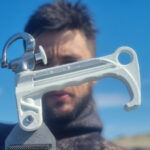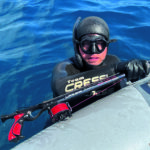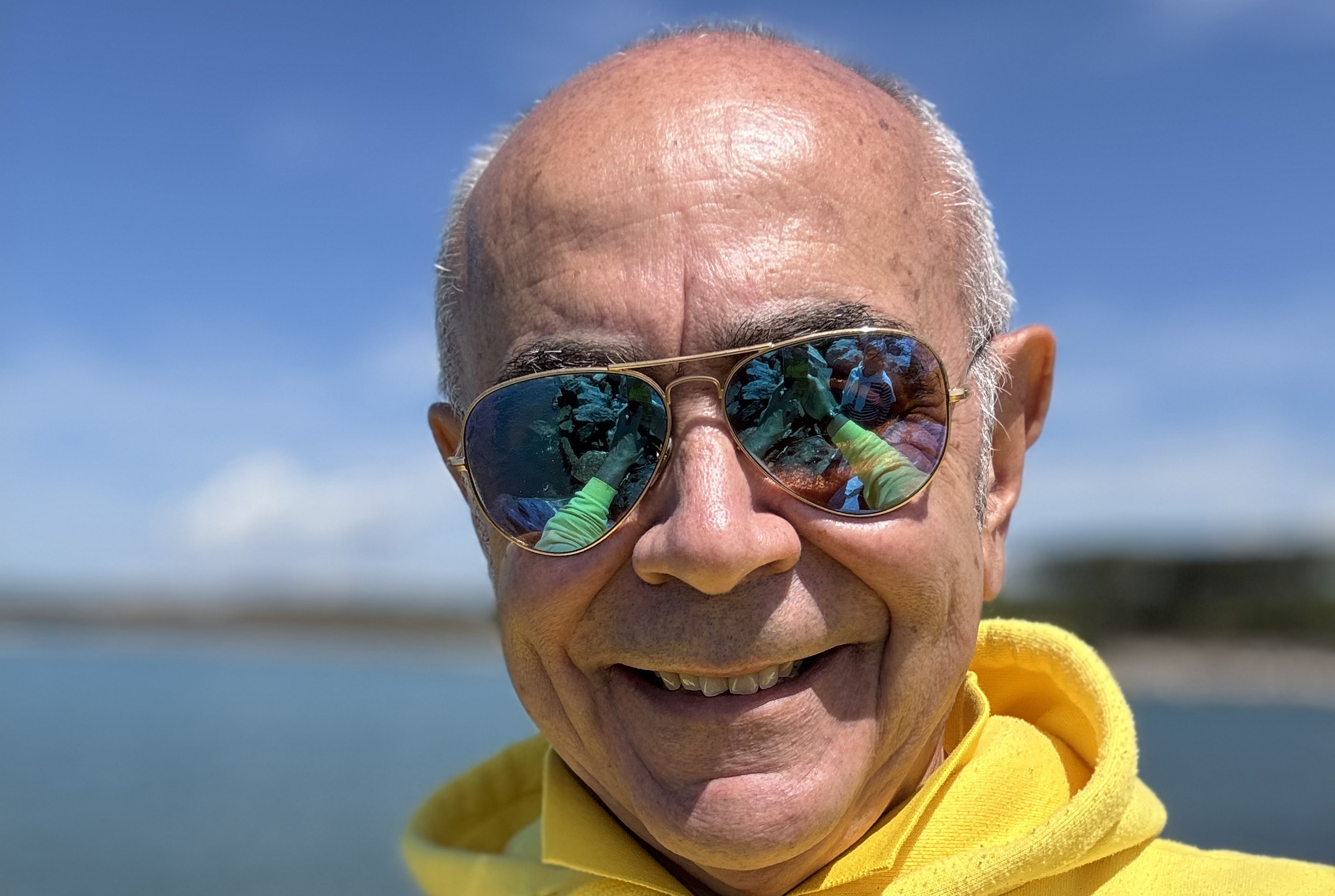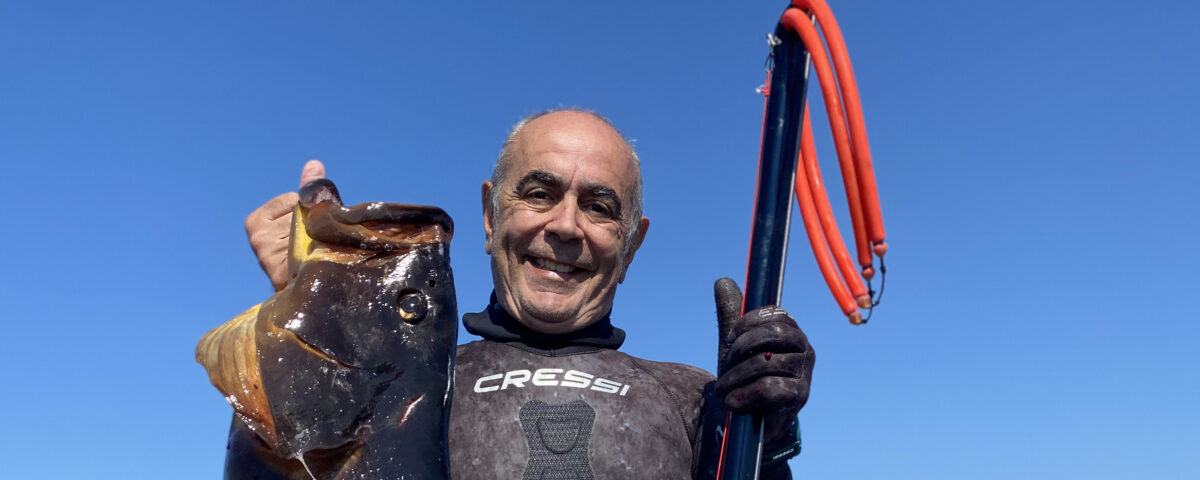Up Close: Nino Piras

Saplast: The New Hannibal Handle
29 July 2025
Puretti’s Corner
29 July 2025Among all the well-known figures in our world, Nino Piras (with Cressi since 1984) is one of the ones I know the least. Yet his name has always meant Cressi Sub, and more specifically, the Cressi Sub competition team and sporting events. Nino has always worked behind the scenes, quietly contributing to the legendary success of this extraordinary team. He has often avoided the spotlight, letting the facts speak for themselves, announcing sponsorships only once they were established. Beyond his time at the company, Piras has had an exceptional career as a sporting goods representative and founded one of the leading agencies in Tuscany—long a top player in the industry—alongside
Gherardo Zei
Let’s take a step back and tell a part of this story.
Cressi has had its own sports team since the 1950s (perhaps the first ever spearfishing team), winning an impressive twelve world titles. The first was in 1957 with Mario Catalani, followed by Terry Lentz from the U.S. in 1959, and Bruno Hermanny from Brazil in 1960. Those were the golden decades when underwater sports had wide social recognition, and champions were viewed as adventurous heroes.
I have the full collection of Mondo Sommerso magazines from 1959 and 1960 and can confirm that the victories of Lentz and Hermanny were celebrated on par with Olympic athletes. Photos show award ceremonies surrounded by popular acclaim.
Cressi continued its commitment to competition even after that golden era. In 1971, Raoul Choque from Chile brought home a win. Then came the incredible three consecutive titles from Renzo Mazzarri, followed by Stefano Bellani in 2004, Daniel Gospic in 2010, and more recently, Xavier Blanco in 2014 and Santi Lopez Cid in 2023. Cressi's spearfishing competition team has truly written the history of the World Championships—from the very first edition in 1957 up to today—and it continues to look forward to the future.
Even in freediving, the Cressi team is legendary. They’ve had champions like Jacques Mayol, a pioneer of many techniques still in use today, Umberto Pelizzari, and Deborah Andollo—figures whose contributions go far beyond mere world records. Later, Guillaume Néry, a world-class athlete and multiple French record holder, joined the team. Guillaume became a global icon not only for his sporting achievements but also for an incredibly artistic short film: Free Fall—shot at Dean’s Blue Hole, the deepest blue hole in the world, filmed and directed by his partner. It remains one of the most viewed freediving videos online and is highly recommended.
Even more famous, though almost unbelievably, is a video of Néry “interpreting” a Naughty Boy song written by Beyoncé, titled Running—a video that has surpassed 450 million views. These two clips may be the most widely seen in the history of freediving.
“With Guillaume,” says Piras, “I personally brought him on board, like most of the athletes from the past 35 years. We met in Corsica during one of our annual Cressi Sub catalog shoots. After the shoot, he said: ‘Let’s go fishing together.’
Honestly, it was a thrill diving alongside someone whose freediving capabilities are twice my own...”
Today, Cressi athletes are scattered across the world, and Nino still manages most of the contacts. There's a constant exchange of ideas and testing of prototypes. Athletes from different teams give feedback through Nino, suggesting practical improvements to equipment. This collaboration ensures steady, balanced progress in research and development.
Every time a new Cressi catalog is in the works, meetings are held with athletes to talk about product performance and conduct field testing. These are real technical training camps where new gear is tested, and each product gets a detailed evaluation sheet used for future development.
The Cressi team is like a “sporting family”, retaining athletes for over twenty years—and Piras has been its key coordinator throughout. Even as a kid, Nino had a strong desire to work in this field, nurtured by his passion for technical diving magazines. He was always fascinated by how gear performed in the water.
“Our spearfishing team,” he explains, “is not just about results. It's important to have athletes who are reasonable, cooperative, and strong in the water. Developing a ‘Cressi style’ matters. In a family, a parent doesn’t want hotheaded kids.”
What kind of person is Nino Piras?We’ve already said he’s a great sportsman and spearfisher, and he’s been the Team Manager of the Cressi Sub Competition Team since 1991—the most legendary spearfishing team in history, from the early championships in the ’50s, to the exploits of Mazzarri, and now to the new generation, with talents like Stefano Konjedich, Giulio Cavaliere, Riccardo Golini, and veterans like Cristian Corrias, Andrea Settimi, Dario Maccioni, and the late Bruno De Silvestri, all of whom have added to the team’s 16 national titles.
Also part of the team are champions Riccardo Molteni, Francesco Diversi, Francesco Piras, and many international athletes. A special mention goes to Luigi Puretti, vice world champion, a tenacious and technically skilled athlete whose attitude fits perfectly with the company's spirit. Last year, Nino focused on rejuvenating the team for the future.
“New generations needed to be included! Renzo Mazzarri, Riccardo Molteni, and Stefano Bellani are still with us and bring their experience, but we must also look forward,” says Piras.
What about Nino as a person?
From the interviews over the years (we’ve never met in person), he strikes me as someone who still feels mentally like he’s twenty—humorous, polite, eager to act. He’s positive, enthusiastic, and enjoys working with people. His career as a Team Manager proves his drive. He's naturally impulsive, but he also knows how to pause and think before speaking. He believes the best qualities in a person are calmness, the willingness to listen and learn, and above all, good manners. He despises rudeness, arrogance, and especially spearfishers who only talk about depth.
Like many of us, he sometimes dreams of living on a remote island—maybe in the Caribbean, wearing flip-flops and shorts year-round.
But those are just dreams. The encounter that changed his life was with Paola, who later became his wife. She helped him shift from a rebellious, solo-diver spirit to building a family. The happiest day of his life, he says, was the birth of his son Andrea, a moment he proudly shared by being present at the delivery.
His tastes?
Nino loves Florence, his home:
“Every day, sometimes even due to the changing light, it looks different. You see its landscapes and monuments from a new perspective—more beautiful than the day before.”
At the table, he loves pasta, cooked every which way, and he doesn't hold back. After meals, a good coffee. In summer, when it’s really hot, he enjoys a cold bitter lemon soda.
In his spare time, he watches action movies, preferably sci-fi, and listens to Latin music, hip-hop, or ambient, especially when he needs to focus.
But Nino wasn’t born a Team Manager—he has a past as a great competitor and a present as a passionate fisherman, like the rest of us.
Massimo Scarpati was his idol—Nino followed him as a kid through magazines, admiring both his sporting and professional achievements.
Nino had a solid competitive career, though with some regrets. He was selected as a reserve for the 1992 World Championship in Spain but was denied permission to attend by Sergio Tacchini, the company he then represented. Another regret is the 1989 Italian Championship in Santa Maria di Leuca, where he finished second by just a few points—despite competing with a fever.
He won the 1987 Italian Second Division Championship in Cala Gonone, defeating some of the top national athletes at the time. He was on the national team as a reserve and part of the European championship-winning squad. Eventually, as work demands increased, he gave up competitions.
“I no longer had the focus needed for competition,” he told friends.
Still, his love for fishing never faded. In summer, if he can choose, he loves early-morning trips to the reefs; in winter, shallow water and rough seas in search of elusive sea bass. He loves Cap Corse, tackling it by inflatable boat with a 110 speargun, hoping for one perfect fish (while knowing that many days depend on what the sea offers). These days, he often returns to Vada’s reefs, where he started fishing as a boy.
I once asked Nino about his best and worst fishing days.
The best?
On a yacht at Isola del Giglio, landing two massive amberjacks—each over 45 kg—one at sunset and one at sunrise. “Quite the performance!” he told me.
And the worst day, he said, was in Greece. Carried away by youthful enthusiasm at the end of a long day at sea, he convinced himself he could help a friend extract a grouper from a deep hole. Fortunately, nothing bad happened, but Nino explained:
“I’m sure that in those final dives, I took serious risks because I had been in the water too many hours. That day, I made a mistake by pushing every breath-hold to the limit — but I was lucky.”
When I asked him what was the most meaningful thing ever said to him by a fellow spearfisher, he replied that during one of the first Italian championships he competed in — held in Palau — at the end of the third day, the legendary Antonio Toschi said to him:
“So it’s not just luck — you’re really good!”
It referred to the fact that, thanks to his deep passion for aspetto (the stealth hunting technique), Nino had caught a nice dentex on each of the two competition days.
That championship was grueling, spread across three rounds, and for Nino, receiving praise from a living legend like Toschi was a huge acknowledgment and motivation to keep improving professionally. It was 1985, and that was the first time he remained in the top division, alongside the best champions of the time.
His current dream is to organize a “model competition” — to set an example of how all tournaments should be run. He even promised to try making that happen at the Italian Championship in Gallipoli at the end of June (this interview went to print before his departure), an event sponsored by Cressi and Suzuki.



